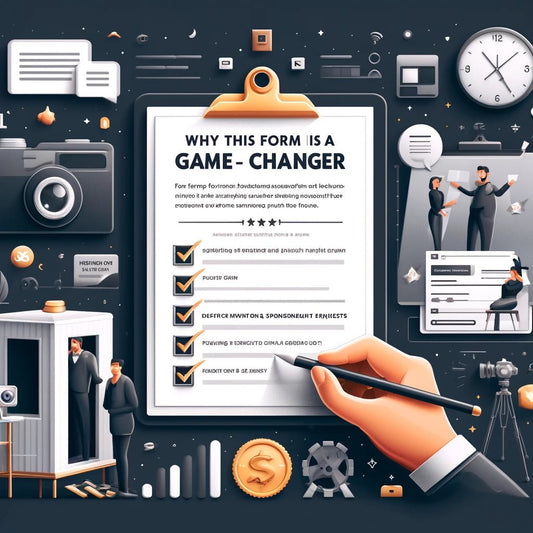
Elevate Team Engagement with Virtual Corporate Events: A Guide
Share
.jpg)
Why Are Virtual Corporate Events Becoming Popular?
Why are virtual corporate events gaining popularity? Let's dive into what makes them so appealing. From the flexibility and convenience they offer to the cost savings and expanded reach, virtual corporate events are transforming the way businesses engage with their audience. Not only that, but these events also contribute to environmental sustainability. Get ready to explore the reasons behind the rise of virtual corporate events and how they are reshaping the corporate landscape.Flexibility and Convenience
Flexibility and convenience are two key factors that contribute to the growing popularity of virtual corporate events.
- Flexibility: Virtual events allow participants to join from anywhere, eliminating the need for travel and accommodation expenses. Attendees can easily fit the event into their schedules, as virtual events often offer flexible timing options.
- Convenience: With virtual events, attendees can participate from the comfort of their own homes or offices. They can access the event using their preferred devices, such as laptops, tablets, or smartphones. This convenience makes virtual events more accessible to a larger audience.
Cost Savings
Virtual corporate events offer numerous benefits, including significant cost savings for businesses. Here are some ways in which virtual corporate events can help companies save money:
By opting for virtual corporate events, businesses can enjoy significant cost savings while still providing valuable experiences for attendees.
Expanded Reach and Accessibility
Expanding the reach and enhancing accessibility are key advantages of virtual corporate events, as they allow businesses to connect with a larger audience and overcome geographical barriers.
- Expanded Reach: Virtual events provide the opportunity to reach a global audience, attracting participants from different regions and time zones.
- Accessibility: With virtual events, attendees can easily join from the comfort of their own homes or offices, eliminating the need for travel and reducing costs.
- Inclusivity: Virtual events enable individuals with disabilities or mobility constraints to participate and engage in corporate activities.
- Convenience: Attendees have the flexibility to join virtual events at their convenience, which leads to increased attendance rates and greater participant engagement.
- Interactivity: Virtual platforms offer interactive features such as live chats, polls, and Q&A sessions, which enhance audience engagement and encourage active participation.
Environmental Sustainability
Virtual corporate events provide numerous benefits, particularly in terms of environmental sustainability. By eliminating the need for travel and reducing the consumption of physical resources, virtual events greatly contribute to a lower carbon footprint compared to in-person events. Companies can actively support environmental sustainability by opting for virtual conferences, seminars, and team-building activities. These virtual events leverage interactive tools and features to enhance attendee engagement while also minimizing waste. Here's a pro-tip: Encourage participants to use virtual backgrounds during video conferences instead of physical banners and signage, promoting environmental consciousness and reducing the need for additional resources.
Types of Virtual Corporate Events
In the world of virtual corporate events, there are various types that offer unique experiences and opportunities. From virtual conferences that bring professionals together to virtual seminars and workshops that impart knowledge and skills, to virtual trade shows and exhibitions that showcase products and services. And let's not forget about virtual team-building activities that foster collaboration and camaraderie. With a multitude of options available, businesses can find the perfect virtual event to suit their needs, goals, and objectives.Virtual Conferences
Virtual conferences have become increasingly popular due to their flexibility, cost savings, expanded reach, and environmental sustainability. Virtual conferences, also known as online conferences, offer a convenient way for attendees to participate from anywhere in the world. This eliminates the need for travel or accommodation expenses, making them highly flexible and cost-effective.
- Flexibility and Convenience: Attendees can participate in virtual conferences without the burden of travel or accommodation expenses, making them highly convenient.
- Cost Savings: Virtual conferences eliminate the need for renting a venue, catering services, and travel costs for both organizers and attendees, resulting in significant savings.
- Expanded Reach and Accessibility: By eliminating geographical barriers, virtual conferences have the potential to attract a larger audience. They also provide access to individuals who may have difficulty attending in-person events. This expanded reach allows for greater networking and idea exchange.
- Environmental Sustainability: Virtual conferences offer environmental benefits by reducing carbon emissions associated with travel. Additionally, they minimize the use of paper materials, contributing to a greener and more sustainable event.
Virtual Seminars and Workshops
Virtual seminars and workshops have increasingly gained popularity as part of virtual corporate events. These events offer numerous advantages such as flexibility, cost savings, expanded reach, and environmental sustainability. When planning and executing virtual seminars and workshops, certain considerations need to be made. These include defining objectives and goals for the Virtual Seminars and Workshops, selecting the right virtual event platform for hosting the events, designing engaging agendas that cater to the attendees of the Virtual Seminars and Workshops, and ensuring technical setup and support to ensure smooth running of the events. To ensure the success of virtual seminars and workshops, it is important to prepare speakers and presenters specifically for the Virtual Seminars and Workshops, engage attendees and participants in interactive discussions related to the topics of the Virtual Seminars and Workshops, and utilize interactive tools and features available on the virtual event platform. Following industry best practices such as testing and rehearsing the Virtual Seminars and Workshops before the actual event, providing clear instructions and communication to the participants of the Virtual Seminars and Workshops, encouraging networking and collaboration among the attendees, and gathering feedback for evaluation purposes is essential for the success of the Virtual Seminars and Workshops.
Virtual Trade Shows and Exhibitions
- Virtual Trade Shows and Exhibitions have become increasingly popular in the corporate world due to their many advantages.
- Expanded Reach: Virtual events allow businesses to connect with a global audience, breaking down geographical barriers.
- Cost Savings: Companies can save significant expenses on travel, venue rentals, and booth setup, resulting in higher ROI.
- Convenient Access: Attendees can participate from the comfort of their own homes or offices, eliminating the need for travel arrangements.
- Engaging Content: Virtual platforms offer various interactive features like live chat, virtual booths, and product demos, enhancing attendee engagement.
- Data Analytics: Event organizers can gather valuable data on attendee behavior and preferences, enabling better decision-making for future events.
- Eco-Friendly: Virtual Trade Shows and Exhibitions have a smaller carbon footprint compared to physical events, contributing to environmental sustainability.
Virtual Team-Building Activities
Enhancing Teamwork and CollaborationVirtual team-building activities play a vital role in fostering teamwork and collaboration within remote work environments. These activities promote employee engagement and strengthen relationships among team members. Here are some excellent virtual team-building activities to consider:
- Virtual Icebreakers: Start your meetings or sessions by incorporating fun icebreaker activities. These activities help team members get to know each other better, building camaraderie and trust.
- Virtual Scavenger Hunts: Organize online scavenger hunts where team members hunt for specific items or clues in their own homes or virtual environments. This interactive activity promotes engagement and encourages creative problem-solving.
- Virtual Escape Rooms: Engage your teams in virtual escape rooms, challenging them to solve puzzles and riddles together. This activity fosters effective communication and enhances problem-solving skills.
- Virtual Trivia or Quiz Nights: Host virtual trivia or quiz nights to create a competitive yet fun environment. Team members can showcase their knowledge while enjoying an interactive experience.
- Virtual Team-Building Games: Play online multiplayer games that require teamwork and communication to achieve common goals. This collaborative gaming experience strengthens bonds among team members.
Fact: According to a study, virtual team-building activities can boost employee morale and productivity by up to 87%.
Planning and Execution of Virtual Corporate Events
Virtual corporate events have become an essential part of our modern business landscape. In this section, we'll dive into the nitty-gritty of planning and executing these events. From defining objectives and goals to selecting the perfect virtual event platform, we'll explore how to make your event a resounding success. We'll also discuss the importance of designing an engaging and interactive agenda and ensuring seamless technical setup and support. Get ready to take your virtual corporate events to the next level!Define Objectives and Goals
- To ensure a successful virtual corporate event, it is crucial to define clear objectives and goals at the outset.
- These objectives and goals can be established by following a step-by-step approach:
- Identify the purpose of the event, such as increasing brand awareness, generating leads, or fostering employee engagement.
- Set measurable goals that align with the purpose of the event, such as acquiring a certain number of new clients or improving attendee satisfaction.
- Outline key performance indicators (KPIs) that will be used to measure the success of the event, including registration numbers, attendee engagement, or post-event survey results.
- Define the target audience, specifying the specific group of individuals the event aims to reach, such as industry professionals, potential customers, or internal employees.
- Create a focused agenda that reflects the objectives and goals of the event, ensuring that each session or activity contributes to their achievement.
- Communicate the defined objectives and goals clearly to all key stakeholders, including speakers, sponsors, and attendees, so that everyone understands the purpose and expectations of the event.
- By following these steps and defining objectives and goals upfront, virtual corporate events can be effectively planned and executed to achieve the desired outcomes.
Selecting the Right Virtual Event Platform
When selecting the right virtual event platform for your corporate event, it is important to consider key factors that align with your event goals and requirements.
- Features and capabilities: Look for a platform that offers a wide range of interactive features such as live streaming, virtual networking, breakout rooms, and audience engagement tools.
- Scalability and customization: Ensure that the platform can handle your expected number of attendees and offers customization options to match your branding and event theme.
- Security and reliability: Prioritize a platform that provides robust security measures, data protection, and reliable technical support.
- User-friendly interface: Choose a platform that is intuitive and easy to navigate for both organizers and attendees.
- Integration capabilities: Consider whether the platform can integrate with other tools or apps that you plan to use, such as registration systems or CRM software.
According to a survey by EventMB, 79% of event professionals consider selecting the right virtual event platform as the most crucial decision in planning virtual events.
Designing Engaging and Interactive Agenda
Designing an engaging and interactive agenda is crucial for the success of virtual corporate events. When designing the agenda, it is important to clearly define the event's objectives and goals to ensure a focused agenda. Additionally, it is beneficial to include a mix of formats, such as presentations, panel discussions, Q&A sessions, and interactive workshops, in order to keep participants engaged. Technology tools like live polls, chat functions, and breakout rooms can also be utilized to encourage participant engagement. To make the agenda even more interactive, consider incorporating elements like gamification, virtual networking sessions, and live demos to keep attendees actively involved. It is also important to allocate sufficient time for breaks and networking opportunities in order to prevent online fatigue and encourage collaboration.
Ensuring Technical Setup and Support
- Ensuring Technical Requirements: Evaluate the necessary equipment, software, and internet bandwidth required to ensure a successful virtual corporate event.
- Choose the Right Virtual Event Platform: Opt for a platform that provides dependable technical support, seamless integration, and user-friendly features to guarantee a smooth setup and support.
- Test the Technology: Prior to the event, thoroughly examine the audio, video, and connectivity to identify and resolve any issues or glitches that may arise.
- Provide Clear Instructions: Furnish participants with comprehensive instructions on how to access the platform, system requirements, and troubleshooting guidelines to ensure a seamless experience.
- Onsite Technical Support: Allocate dedicated technical staff to monitor the event and promptly resolve any technical difficulties that may arise during the proceedings.
- Backup Plan: Prepare a contingency plan in the event of technical failures, such as having a backup internet connection or alternate communication channels as a backup.
Key Considerations for Successful Virtual Corporate Events
When it comes to virtual corporate events, there are key considerations that can make all the difference in their success. From preparing speakers and engaging attendees to utilizing interactive tools and features, these sub-sections hold the secrets to creating an exceptional virtual event experience. So, let's dive in and explore how to ensure your virtual corporate event leaves a lasting impact and keeps participants connected and engaged throughout. Get ready to discover the strategies that will elevate your event to new heights!Preparing Speakers and Presenters
Preparing speakers and presenters is essential for the success and engagement of virtual corporate events. Follow these important steps to ensure a smooth experience:
- Communicate expectations: Clearly communicate the event format, duration, and any technical requirements to the speakers and presenters Preparing Speakers and Presenters.
- Provide guidelines: Share guidelines on presentation style, content structure, and use of visual aids to ensure a cohesive and professional delivery Preparing Speakers and Presenters.
- Offer technical support: Assist speakers with virtual platform navigation, microphone setup, lighting, and any other technical needs to ensure a smooth presentation Preparing Speakers and Presenters.
- Rehearsals: Conduct rehearsals to familiarize speakers with the virtual platform features and to address any technical issues or concerns Preparing Speakers and Presenters.
- Encourage engagement: Share strategies for engaging the virtual audience, such as using interactive tools, encouraging questions, or utilizing chat features.
- Time management: Guide presenters on time management techniques to ensure they stay within their allotted time slot and allow for Q&A or discussion.
- Provide feedback: Offer constructive feedback on presentation style, delivery, and content to help speakers improve and ensure a high-quality event Preparing Speakers and Presenters.
Engaging Attendees and Participants
Engaging attendees and participants is crucial for the success of virtual corporate events. Here are some tips to create an engaging experience:
- Interactive sessions: Incorporating interactive elements like polls, quizzes, and Q&A sessions is essential to engage attendees and participants actively.
- Virtual networking opportunities: Establish virtual networking rooms or breakout sessions where attendees can connect with each other, exchange ideas, and build professional relationships to keep them engaged.
- Engaging content: Make sure that your event content is informative, relevant, and interesting in order to captivate and involve the participants. Utilize a mix of formats such as videos, presentations, and live demos to maintain their engagement and focus.
- Gamification: Enhance the fun and interactive nature of the event by incorporating gamification elements like competitions, challenges, or leaderboards, which will undoubtedly engage the attendees and participants.
- Collaboration tools: To encourage collaboration and group activities, take advantage of online collaboration tools like virtual whiteboards or document sharing platforms.
By implementing these strategies, you can enhance attendee engagement and make your virtual corporate event a memorable and interactive experience.
Utilizing Interactive Tools and Features
Utilizing interactive tools and features is essential for the success of virtual corporate events. These tools play a vital role in enhancing engagement, collaboration, and networking among participants. Here are some examples:
- Real-time polling: These interactive surveys enable organizers to gather instant feedback from attendees.
- Live chat: Participants can interact and ask questions during presentations or panel discussions thanks to this interactive feature.
- Breakout rooms: These facilitate small group discussions and networking sessions, allowing for more personalized interactions.
- Virtual whiteboards: By allowing participants to share ideas and brainstorm together, these whiteboards foster creativity and collaboration.
- Gamification: Adding interactive games or quizzes can make the event more entertaining and encourage active participation from attendees.
By utilizing these interactive tools and features, virtual corporate events can transform into engaging, dynamic, and unforgettable experiences for all participants.
Best Practices for Virtual Corporate Events
When it comes to virtual corporate events, nailing the execution is key. In this section, we're diving into the best practices that can make your event stand out from the rest. We'll cover everything from testing and rehearsing before the big day to providing crystal-clear instructions and communication. We'll also explore how to encourage networking and collaboration among participants, and the importance of gathering feedback to evaluate the success of your event. Time to unlock the secrets of successful virtual corporate events!Test and Rehearse Before the Event
Testing and rehearsing before the event is essential for the success of virtual corporate events. Here are some steps to follow:
- Check technical setup: Ensure that all equipment and software are working properly.
- Perform a run-through: Conduct a practice session to familiarize yourself with the virtual event platform and address any technical issues.
- Test connectivity: Test and verify your internet connection to ensure it is stable and fast enough for seamless streaming.
- Review content: Go through all presentations, videos, and materials to ensure they are accurate and error-free.
To improve the overall experience, consider these suggestions:
- Invite audience feedback during rehearsals to identify any areas that require improvement.
- Provide additional training and support for speakers and presenters to enhance their virtual presentation skills.
- Encourage participants to test their devices and internet connectivity before the event so they are prepared.
Provide Clear Instructions and Communication
Establishing clear instructions and effective communication is crucial for the success of virtual corporate events. It is essential to provide clear instructions and communication to ensure that participants understand the event's objectives and can actively engage throughout the proceedings.
| Tips for Providing Clear Instructions and Communication |
| 1. Create a detailed event agenda and distribute it in advance. |
| 2. Clearly articulate event guidelines, platform usage, and participation expectations. |
| 3. Utilize communication tools like chatboxes and Q&A sessions for attendee queries. |
| 4. Provide technical support throughout the event to address any issues. |
By following these suggestions, virtual event organizers can ensure a seamless and engaging experience for all participants. Providing clear instructions and effective communication foster a sense of understanding and promote active participation, contributing to the overall success of the event.
Encourage Networking and Collaboration
Encouraging networking and collaboration is crucial for the success of virtual corporate events. Here are some ways to foster connections among attendees:
- Implement icebreaker activities: Initiate the event with icebreaker activities to facilitate attendees in getting to know each other and feeling more comfortable interacting.
- Organize virtual networking sessions: Allocate specific time slots for networking sessions, where participants can connect with each other through virtual breakout rooms or chat functionalities.
- Incorporate collaborative activities: Include interactive group activities or collaborative projects that promote cooperation and teamwork among participants.
- Establish online discussion forums: Create online discussion forums or social media groups, enabling attendees to continue networking and collaborating even after the event concludes.
True story: At a recent virtual corporate event, participants were randomly paired for short one-on-one networking sessions. This resulted in the formation of new business partnerships and collaborations, confirming the effectiveness of virtual networking in fostering connections and professional growth.
Gather Feedback and Evaluate Success
Gathering feedback and evaluating the success of virtual corporate events is crucial for continuous improvement and future planning. Here are some key points to consider:






